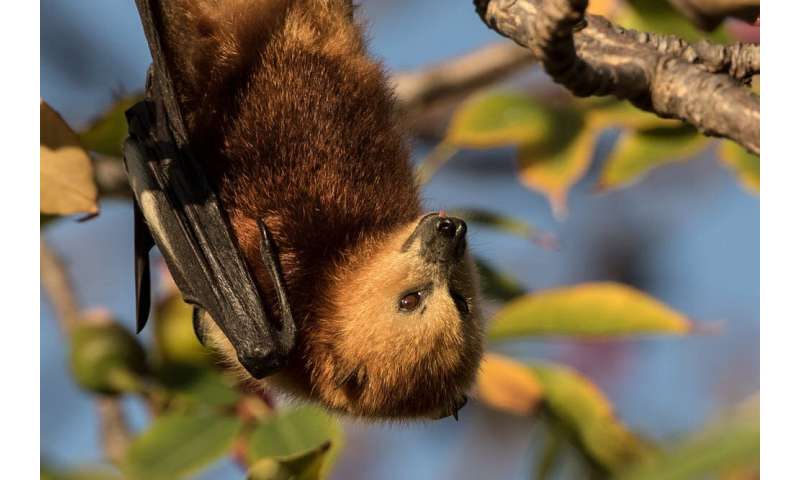
The endangered Mauritius fruit bat is once again the centre of a controversial cull at the hands of its government, much to the alarm of wildlife conservation organisations. Under pressure from both farmers and the public, the government of the Indian Ocean island recently announced a plan to cull 10% of its 80,000 or so fruit bats to protect the nation's fruit industry.
Bat culling in Mauritius is fraught with deep divisions and entrenched interests. No one disputes that the fruit bat—the clue is in its name—can cause damage to lychee and mango harvests in orchards and private gardens. That's why pressure from fruit farmers and the general public led the government to order culls of tens of thousands of bats—at least a third of the species' population—in 2015, 2016, 2018 and 2019. Many conservationists feel that these culls contravene the UN Convention on Biological Diversity, which Mauritius was the very first nation to sign and ratify in 1992.
This has led to perpetual arguments and increasing divisions between farmers, agricultural companies, fruit traders, conservationists academics, government agencies, media and the public.
These bats are found nowhere else in the world. That's why conservation organisations both in Mauritius and elsewhere have raised concerns that these repeated culls could decimate their population. Large island fruit bats are particularly vulnerable because reproductive rates are low, with females giving birth to just one pup per year at best, which makes it difficult for populations to recover losses. Six of the past eight bat extinctions, including the Guam flying fox and the lesser Mascarene flying fox, were similar species who succumbed to similar combinations of intense hunting and habitat loss.
Mauritius has already lost two bat species to extinction, and its fruit bats now find themselves in the same precarious situation. Less than 4% of their native forests remain, so there isn't much leeway for the bats to recover from culls.
Blame birds—not bats
However, there is more to this case of human-wildlife conflict than first meets the eye. For one thing, though both the government and media generally portray this as an agricultural problem centred around farmers losing income, several academic studies (including one that one of us worked on) have shown that most of the damage to fruit in the island's orchards is not caused by bats but by birds, often species invasive in Mauritius. Bats, however, make for much better scapegoats.
Bats don't specifically target orchards but, to the dismay of many Mauritians, also visit people's backyards, feeding in large groups and making a great deal of noise and mess. These intrusions are hugely irritating and certainly don't help bats with their popularity. Surprisingly though, we've found in our research that it is the general public who have the most hostile attitudes towards bats, many wanting them extinct. Orchard owners had softer NIMBY ("not in my backyard") attitudes towards bats, wanting the damage taken care of but the bats left alone.
There is also a political angle to any human-wildlife conflict, involving political and economic interests, and the relative dynamics of institutions. It would not be fair to presume the entire government of Mauritius is in favour of killing bats, nor that this is necessarily its own first choice course of action. While the Ministry of Agro-Industry and Food Security may be ordering the culls, its own conservation and agricultural outreach sub-agencies are also keen to explore gentler solutions with minimal resources. To this end, a series of workshops and dialogues with different groups and government agencies between 2017-18 offered initially promising results.
Meanwhile, the scientific conservation community repeatedly emphasises the importance of evidence-based decisions regarding bat culling. The International Union for the Conservation of Nature (IUCN) has issued official letters, passed a formal resolution and a position statement urging for a U-turn on culling. It has even sent specialist technical assistance in the shape of conservation mediators and bat experts, requesting the Mauritian government to develop alternatives.
Non-lethal damage control solutions do exist. Orchards can be covered in nets, for instance, or trees can be planted in rows and pruned to stay small, which much improves the efficacy of netting as well as crop yield. Such techniques have been shown to work well in Australia and were demonstrated by experts from a Queensland lychee farm during a tree netting workshop run as a collaboration between IUCN, the Mauritian Wildlife Foundation (an NGO) and the Mauritian government.
But the conflict seems at an impasse, as the proposed practical measures are proving near impossible to implement. So long as people are divided, and neither side trusts the other, evidence-based arguments simply won't gain traction. There is great need for extensive mediation work to bring the parties together and rebuild cooperative relationships. As so often in complex human wildlife conflicts, the missing piece is the acceptance that you'll rarely solve a complex social problem by arguing about facts.
Public opinion is deeply divided, and the escalating tensions between the farmers, public, conservationists, and government are the primary obstacle to progress. Soon this may become an intractable hindrance to finding any commonly acceptable way forward.
This article is republished from The Conversation under a Creative Commons license. Read the original article.![]()
Citation: Why Mauritius is culling an endangered fruit bat that exists nowhere else (2020, November 27) retrieved 27 November 2020 from https://ift.tt/3mqguAJ
This document is subject to copyright. Apart from any fair dealing for the purpose of private study or research, no part may be reproduced without the written permission. The content is provided for information purposes only.
"fruit" - Google News
November 27, 2020 at 07:11PM
https://ift.tt/3mqguAJ
Why Mauritius is culling an endangered fruit bat that exists nowhere else - Phys.org
"fruit" - Google News
https://ift.tt/2pWUrc9
https://ift.tt/3aVawBg
Bagikan Berita Ini














0 Response to "Why Mauritius is culling an endangered fruit bat that exists nowhere else - Phys.org"
Post a Comment